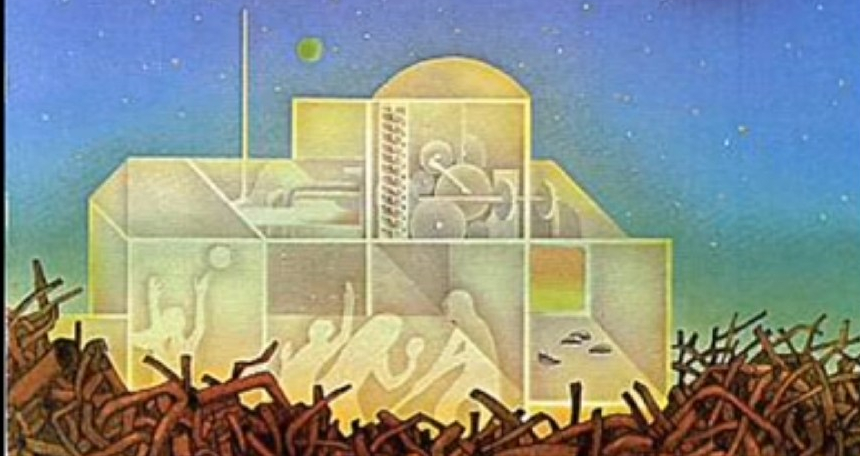My latest review is of a cautionary tale of sorts, a story of sad truth, and one that I read twenty years ago. It is even more impactful in audio, and I randomly decided my lunchbreak was the perfect time to listen to it, recapturing the moment we find out the brutual truth of this story’s events.
 There Will Come Soft Rains by Ray Bradbury
There Will Come Soft Rains by Ray Bradbury
My rating: 5 of 5 stars
August 4, 2026, in Allendale, California.
It is seven o’clock a.m., and a smart home is beginning the day as it should – preparing breakfast, providing reminders of the time and the day’s schedule, cleaning house, and moving through the day’s activities (pancakes, martinis and egg sandwiches, the children’s hour, dinner, poetry in the study, a cigar by the fireplace, warming up the beds for bedtime . It all sounds so amazing, a home of the future, a smart home, caring for its owners and setting them on their path for the day.
Except for one problem: the owners are not there. They’re no longer there, and they are never coming back. Because the very embracing of technology and a home that can provide so much, did not provide the most vital operation: protecting the family that lived within its walls. The family, living a normal, happy, fulfilling life, snuffed out in a blink of an eye, with all that remains of them being the charred outlines on the side of the home that did everything to serve a vital function, except protect the family that lived within. All because they were outside the home. Unaware, unassuming, the victims of something they (and their technology) were powerless to prevent.
In 1950, Ray Bradbury penned “There Will Come Soft Rains” (its title comes from a Sarah Teasdale poem, which is read aloud in the study) for Collier’s. It was published on May 6, 1950, and cited the date as April 28, 1985. The date in 2026 is from a later version, and was the version that I originally read in tenth grade. We read this out of our Literature textbook my sophomore year of high school (1998-1999). I was fascinated by the concept of a smart home doing all the things it could do. It was a home people dream of – it prepares the food, cleans up, warms beds – what an idea! The future seemed so amazing and perfect in the 2000s!
Being the tail end of the 1990s, technology was evolving – the internet (dial up!), cell phones, high definition. Televisions were big, bulky behemoths that rests on tables and furniture, and not attached to walls, internet required a phone line – pick up the phone, disconnect the person using the phone, pay the consequences, our books were still in print, the phrase “smart device” (“device” being whatever is enhanced by this smartness) was not part of our lexicon. It wasn’t even a thing yet.
And then the moment of the story, where all the technology in the world meant nothing when its eventual demise was met, grim and sad the way the demise of those who lived within perished. All to be claimed by the very earth the house stood on. All the while, time marches on.
I enjoyed this short story in tenth grade, fascinated by Bradbury’s style. The picture was painted of a life where technology can be incredible, but also threatening when placed in the wrong hands and used to design weapons that literally create ash from what was once life. My Literature teacher, Mrs. Morrissey (her name isn’t important, but she passed away earlier this year – she was a great teacher and the material we covered was incredible – I give her credit for the interesting readings that year, especially this story), took the story a step further, playing this audio for us on a cassette tape as part of Bradbury’s “The Martian Chronicles” (which Nimoy recorded in 1975). We only listened to this story, but we were fascinated. Because of the words could make the story sound eerie, Leonard Nimoy’s vocal depiction of the events of that day, 27 years into the future, was heavy on the minds of the fifteen and sixteen-year-old kids who listened.
Our world changed a few short years later, but in 1999, school shootings weren’t something widespread, terrorism wasn’t something we saw constantly on television, and the biggest political thing happening at that time was Bill Clinton possibly being impeached.
Interesting times, indeed.
I listened to that audio version again in 2015, after Leonard Nimoy passed away. I enjoyed it in 1999, I enjoyed it in 2015, and I love it even more now after listening to it again today. As I’ve taken steps to make my home “smart” (Echo Dots that control our lights, motion detecting light switches, USB outlets), stories about how all the technology in the world, especially cautionary tales of fiction, are never far from my mind.
The stark reminder of life marching on, the reminder via the poem “There Will Come Soft Rains,” that human extinction means nothing in the natural course of living things (and nature as a whole), and that it will go on.
That’s true, but wow, it really puts an eerie, sad thought in your head, doesn’t it?
